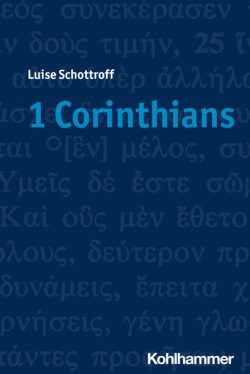Читать книгу 1 Corinthians - Luise Schottroff - Страница 21
На сайте Литреса книга снята с продажи.
1:4–9
ОглавлениеIn 1:4–9 Paul describes his prayers of thanksgiving, using a multi-clause sentence (from 1:4–8) to thank God for the riches the congregation in Corinth possesses: the riches consist in charismata/abilities or gifts conveyed by God. The word charisma occurs in 1:7; in 1:5 he expressly mentions speech (logos) and knowledge (gnōsis) as examples of these abilities. He will discuss them in greater detail in 12:4–11. The power of God’s Spirit effects these abilities. This section gives a positive and unqualified appreciation of the congregation, although in chapters 12–14 Paul also criticizes the way the divine gifts are employed. He there criticizes attempts to build hierarchies with their help. There are questions about whether 1:4–9 has the goal of getting the recipients to receive the letter favorably.41 And yet, the section is more likely concerned with naming the foundations of the congregation, and, therewith, of the new life of all the participants: God’s favor (1:4, 9), fellowship with the Messiah (1:4, 9, 6) and the expectation of God’s just judgment for the entire world (1:8).
1:4 God’s favor (charis) is experienced in the community of the Messiah and in the abilities effected by the Spirit’s power. The congregation consists primarily of those who work with their hands (see on 1:26). Almost all were likely illiterate or recipients of a modest education.42 When Paul emphasizes here the Spirit-worked abilities of speech and knowledge, it becomes clear how fully the messianic fellowship endows those who participate in it.
1:5 They gain the ability for free and open speech (logos), both in the congregation and in society (14:24). Chapter 14 shows how significant speaking openly in the congregation is. The letter consistently shows that experience and competence in the interpretation of Scripture can be presupposed among the addressees. There is nothing to indicate that Paul wants to restrict these abilities and competencies to men (14:34), and already on that basis 14:34—which forbids women to speak publicly—is not to be regarded as Paul’s point of view (see on 14:34). The gift of logos encompasses speech and understanding, an understanding that in society is seen as an exclusive ability of the society’s elite, since they are the ones able to plan, shape and rule. Knowledge (gnōsis) doesn’t refer to intellectual abilities alone but also the abilities brought about by the Spirit’s power: to receive and impart insights that come from divine revelation.
1:6 »You are bearing witness to the Messiah and demonstrating growing strength therein.« The translation of the NRSV reads, »just as the testimony of Christ has been strengthened among you.« With this wording, it remains an open question who is doing the preaching and giving the testimony. There is consensus in the interpretive tradition that the answer is Paul. Along with that, the meaning of the word ebebaiōthē/(the testimony is) confirmed or strengthened, is often construed to be a divine passive.43 Through this interpretation the congregation is seen exclusively as the object of the action. But in 1:5 the issue is their abilities and activities. In Greek, 1:6 is a subordinate clause that begins with kathōs, which here probably means »just as.« The content of this subordinate clause wants to make clear that being endowed with spiritual abilities is a process. This involves testimony (martyrion) that liberation from bondage to domination and destruction occurs through the Messiah Jesus. What is the content of logos and gnōsis? It is the testimony to the Messiah Jesus, which the congregation is rendering publicly, which involves courage and strength that are brought about by God (see the translation above, which leaves open understanding ebebaiōthē as a divine passive here.
